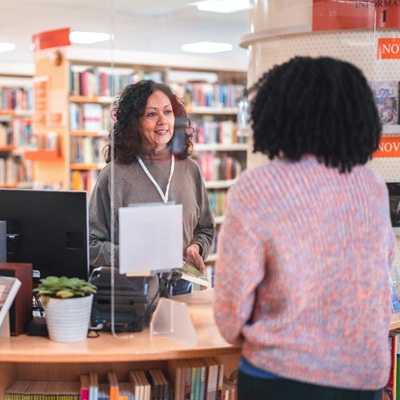Academic Libraries
ALL ACADEMIC LIBRARIES COVERAGE
In an era of shrinking library budgets, innovative consortial relationships are proving essential for maintaining equitable access to resources. Library leaders share how ILS-agnostic consortial borrowing, strategic partnerships beyond traditional resource sharing, and communicating value to stakeholders can multiply a library's impact despite financial constraints.
While working with the children’s literature collection at the University of Minnesota–Duluth—used by education students in their training—Kayleen Jones decided it needed to better represent the Duluth community and broader society. As she reviewed the collection to identify gaps, she was approached by education faculty interested in collaborating to provide hands-on experience for education students to learn about anti-racist practices.
Mary Ton thinks there’s an ethical place for AI in the arts and humanities. She teaches researchers and students about the benefits and limitations of AI in research and the arts, drawing on her background in machine learning, and has presented on the topic across the state.
Describing himself as “aggressively helpful,” law librarian Kris Turner combines traditional legal research with the evolving generative AI world. “Generative AI technology worries many, creates skepticism in others, and is eagerly embraced by some,” Turner notes. “This wildly disparate level of welcome for GenAI means I especially need to show I am open to questions, challenges, and counterarguments.”
Brittani Sterling had planned on going into social work, but when she realized she could help people through librarianship, she chose that path and never looked back.
As Outreach and Information Services Librarian for Cornell University Library and the Cornell Prison Education Program (CPEP), Maddie Reynolds navigates significant barriers to information provision. Her role, working at Auburn Correctional Facility, Cayuga Correctional Facility, and Five Points Correctional Facility, NY, was created by Cornell, as CPEP plans to begin offering bachelor’s degrees beginning in fall 2026.
Until Janet Hyunju Clarke, Associate Dean of Research and Learning at Stony Brook University Libraries, got involved, the Asian American and Pacific Islander (AAPI) students who make up approximately 40 percent of the school’s population had never had a campus club that was open to anyone (as opposed to only students) or celebration related to their heritage. “We wanted to do something at a campus-wide level to show students that their history and experiences matter,” says Clarke.
As the archivist for San Diego’s Comic Arts Fest, Pamela Jackson curates 100,000 comics and ephemera. That alone would distinguish her, but bigger impact flows from her work at San Diego State University (SDSU). Along with SDSU history professor Elizabeth Pollard, Jackson developed a comics-based curriculum that has students more engaged than ever.
While viewed as the academic backbone of the two universities it serves, the Loyola Notre Dame Library “struggled like so many other libraries to bring patrons back into the building following the pandemic,” says Mallory Wareham. “We also faced the ever-present challenge of showing our patrons that libraries are far more than just a quiet study space.”
ALREADY A SUBSCRIBER? LOG IN
We are currently offering this content for free. Sign up now to activate your personal profile, where you can save articles for future viewing












